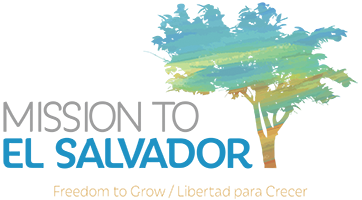
Every January people around the world talk about human trafficking…how to prevent it, the risks, how to identify it, and even how survivors work to overcome the traumas of being exploited. This year, as we mark Human Trafficking Awareness month, we once again turn to this issue here in our own context.
In El Salvador, there are so many factors that make men, women, girls, and boys vulnerable to being trafficked. Poverty is a big one. If you are born into poverty, it’s nearly impossible to work your way out of it. Dreaming and planning for a different future just seems futile until someone comes into your town and promises you a chance in the city, or even in another country. Poverty makes people vulnerable to lies and manipulations of their dreams because of the precariousness of their situation, and there are many in El Salvador who have had their dreams and hopes exploited by traffickers.
Sadly, family members are all too often the ones that push someone into trafficking. Those who are most trusted by a child can become the exploiters. Family-based trafficking because of poverty or a desire to gain more money or influence are not uncommon and this kind of trafficking is extremely devastating for those who are victimized.
Sexual abuse is an epidemic in El Salvador and desensitizes everyone to the exploitation issue. During the lockdown phase of the COVID-19 pandemic, pregnancies among children and adolescents skyrocketed. The pregnancy rate for girls ages 10-14 went up 79.16%, and for girls ages 15-19 it rose 71.6% (Diario Co Latino). This means sexual grooming and abuse is starting at a young age making girls vulnerable to sexual exploitation.
Another factor that is both pushing and pulling vulnerable Salvadorans into trafficking situations is irregular immigration. This is immigration happening outside of the normal, lawful routes. Irregular immigration often begins as human smuggling where people are seeking to cross borders illegally, but often once they have handed over documentation and cash they find themselves at the mercy of the “coyotes” and end up being exploited and victimized. Regardless of who has political power in the U.S., the immigration situation continues to be complex with record numbers of immigrants continuing to seek entrance to the U.S. (U.S. Customs and Border Protection). Some also begin the process legally, and end up being exploited by employers in the U.S. or other countries. Others are transported illegally across borders for purposes of sex or labor trafficking. The immigration issue continues to complicate the trafficking issue as all of these things overlap and create unsafe situations for those who are most vulnerable.
Violence is an additional problem that leads to trafficking and exploitation because of coercion by gangs, ongoing incidents of gender-based violence, and machismo. So often, a girls’ life is just seen as cheap. Shortly before Christmas, a friend told me through tears that her neighbor’s 15 year old daughter had been brutally murdered. It’s not an isolated incident. If the life of a woman or girl is valued as less, than what stops someone from exploiting that life? It’s yet another issue driving the human trafficking problem in El Salvador.
Despite all of these dire statistics and factors, there is always hope to be found. At the Lighthouse Resource Center, one of our focuses is on serving survivors of human trafficking. We seek to do that in a way that restores dignity, gains trusts, and facilitates opportunities for healing and dreaming. The issues are complicated and so is recovery from deep trauma, but the resilience that we see is also deep. The survivors in our program have formed a caring community, they encourage one another, they volunteer in the kitchen cooking lunch for others who come to eat each day, and they help to clean. These women are setting goals, and growing in their faith forging connections with God and each other as they encourage and cheer one another on. They start businesses, and their kids are thriving in school.
The lives of survivors are not defined by exploitation or trauma. They are defined by who they are as people, and who they are as precious women made in God’s image and dearly loved by Him.
This month, and every month we hope you will be encouraged when you think of the survivors we interact with every day. They are strong and resilient and we hope you will stay tuned to hear more about their upcoming successes!
For more information, visit the following sites to read the data mentioned in the post above:
Embarazo de niñas de 10 a 14 años con aumento de 76.16% en la pandemia, Diario Co Latino.
Southwest Land Border Encounters. U.S. Customs and Border Protection.

Leave a Comment